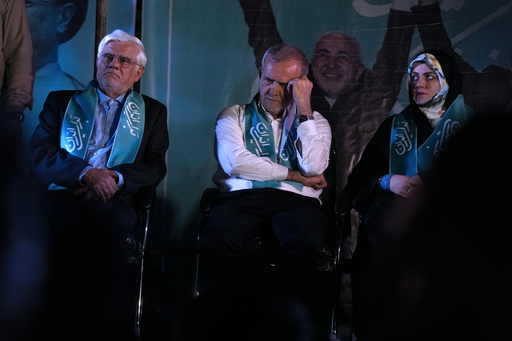In Dubai, United Arab Emirates, Iranian lawmaker Masoud Pezeshkian has expressed disapproval over the death of Mahsa Amini in 2022, stating that it is unacceptable to arrest a girl for her hijab in the Islamic Republic and then return her deceased body to her family. Pezeshkian, a 69-year-old candidate for Iran’s next presidency, finds himself balancing the role of a reformist politician within Iran’s Shiite theocracy, advocating for change while not fundamentally challenging the system overseen by Supreme Leader Ayatollah Ali Khamenei.
Following the historically low voter turnout in Iran’s June 28 presidential election, Pezeshkian faces the challenging task of encouraging a public disenchanted by years of economic hardships and governmental crackdowns to participate in a runoff election scheduled for Friday. Issues of discontent within society including high prices, treatment of girls, and internet censorship have contributed to the people’s dissatisfaction with the government, as highlighted by Pezeshkian during a televised debate on Monday. Despite the low turnout in the initial election, Pezeshkian is set to compete against hard-line former nuclear negotiator Saeed Jalili in the upcoming runoff election.
Being an advocate for moderate and reformist policies, Pezeshkian has aligned himself with figures sharing similar views during his campaign to succeed the late President Ebrahim Raisi, a conservative ally of Khamenei. Pezeshkian’s campaign focuses on improving relations with the West, renegotiating the nuclear deal, and reducing enforcement of the mandatory hijab law in Iran. The disenchantment among voters, exacerbated by governmental crackdowns on dissent and civil unrest, has led to a lack of faith in the political system, ultimately resulting in low voter participation even with the presence of a reformist candidate on the ballot.
Despite his efforts to differentiate himself from hard-liner Jalili and appeal to voters, Pezeshkian faces uncertainty regarding his chances in the upcoming election due to the significant voter apathy seen in the first round. Acknowledging the public’s discontent, Pezeshkian emphasized the need for change and understanding the issues that have led to such widespread dissatisfaction among the electorate. With the runoff election approaching, the future of Iran’s political landscape remains uncertain, with Pezeshkian striving to garner support and trust from the disillusioned Iranian populace.


